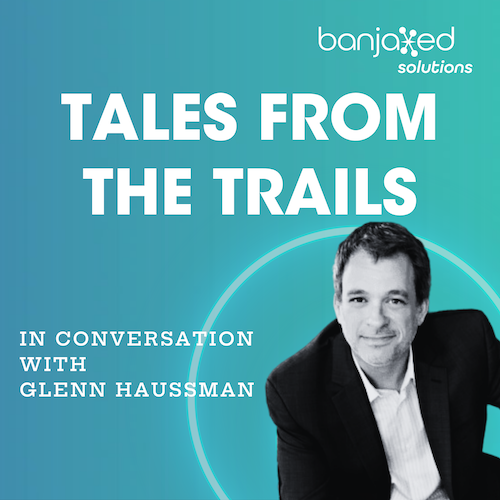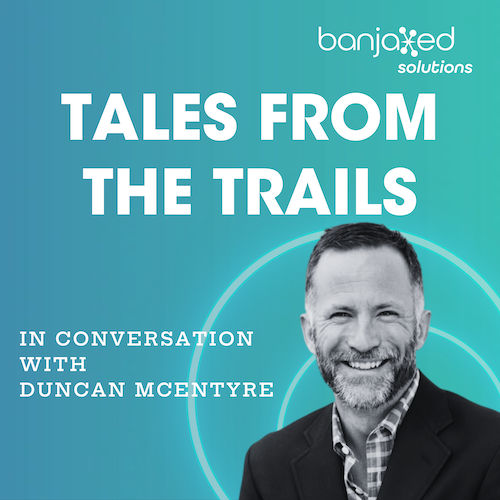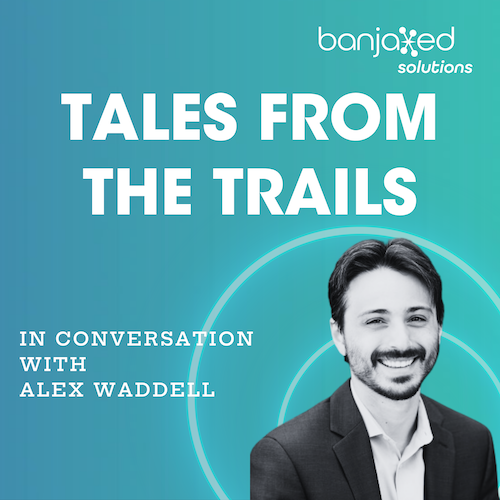
Guest: Glenn Haussman, No Vacancy Podcast
As an entertainment writer, Glenn Hausmann grew tired of the drama and seeing extravagant hotels and restaurants as a backdrop for his celebrity interviews and never experiencing them for himself. An offer to work for a new hospitality magazine was just the spark he needed. Over his years writing about the hospitality industry, Glenn has seen the travel industry and hotel technology evolve by leaps and bounds.
When writing became the medium of the past, Glann shifted once again, this time into audio. As the host and founder of No Vacancy, the number one hospitality podcast, he talks to the most elite names in the industry, reviewing hotels and educating listeners on the latest in hospitality trends and hotel technology.
Check out today’s episode for this hospitality guru’s take on podcasting, hotel technology, and his own evolving career.
Hotel Technology Today
Don’t have time for the full episode? Here’s what you need to know:
The Highlights
2:04 - In my 20s, I was a music and entertainment writer. And it was really bad-paying and between you and me, don't tell anyone, a lot of times, celebrities are horrible people. And it was not something that was fun or rewarding. I also didn't like being stuck in rooms. And this is the pre-internet era with a lot of writers from different publications who were only there to suck up to it.
2:28 - I never felt comfortable with that dynamic and it felt weird but they all took place in amazing hotels. I got to see all this great food I could never eat, all these amazing hotel rooms I could never stay in, and all these incredible professionals that I could never talk to. So I put that in the back of my head for a little while and went on with my career. I was working and doing whatever. And by happenstance, I answered an ad for a magazine. It was going to be a new one but they decided not to go with [that idea]. But they said, “Hey, we got this hotel industry magazine, you want to work for that?” And I did. And ever since then, I've found my home calling. So this is the best industry ever.
3:17 - The non-serious answer is I got really tired of writing. I could only peck on that keyboard so many times. But the truth of the matter is, I think in everybody's career, you go through a lot of changes and during that journey, you learn new things. Sometimes you wind up ending up somewhere completely different than where you expected, if you have an open mind and an open heart and are open to opportunities.
3:38 - One of the things I started to see is the universe started to change. This is going back about 12 years now, and I was starting to listen to podcasts and I was really enjoying this medium, maybe because I grew up loving AM radio and the talk shows, and staying up late at night listening to those kinds of things. The podcasting, the idea of a long form conversation that's more in depth and more meaningful, was really attractive to me. I started dabbling in that while I was working at a prior job, and I loved it so much. I decided to drop everything I knew, quit my career, and start over as a podcaster in the hospitality universe.
4:29 - I think that some of it has to do with the fact that I've listened to so many conversations that pros did like, Larry King on the radio or back in the late ’80s, early ’90s, Bob Costas had this amazing talk show that was non-sports related called Later. And it was on at 1:30 in the morning, but I was in college so I was up and those would be long form in depth conversations, the entire half hour, or sometimes they go over two or three different episodes.
4:53 - I loved that form of communication and I think it really got imbued within me. That plus an incredible sense of curiosity and always thinking more about questions. And thirdly, you need to just really listen to what somebody is saying and respond to that—you can't be all up in your head thinking about what that next question is going to be. It has to be natural and organic. Like when you're at those cocktail parties and you're rocking it out networking.
5:46 - I started back in 1996 in the hotel industry, so I'm going to look at this a little bit differently. I think, number one, the biggest thing that's changed everything is the creation of select service hotels and franchising those hotels in a meaningful way starting in the late 1990s into the early 2000s. It really changed everything. It opened up travel to a much larger percentage of people that group in the middle, the ones that didn't want to stay at economy hotels, but couldn't get all fancied up to go stay at the luxury type of properties. That combined with road culture, I think really started to change absolutely everything and the way that we travel. So to me, I think that's the most significant thing.
6:34 - Number two, most significant thing I think is the birth of the internet and the democratization of travel that came along with it. As people became more empowered to explore and learn, they were able to figure out traveling is awesome, and have more of those dreams of travels. Plus it opened up so much opportunity for the hotel companies. From the times when they had their first nascent websites which were like just brochures to today where you can really see a whole lifestyle created through some of these portholes now.
7:18 - I see that there's opportunity and danger, depending on how you go ahead in the future. Hospitality is all about that human connection and if we fail to have that, then we are going to have a fungible product that's like the airlines. The only reason why I fly my airline of choice is mostly because it's got a worldwide network, it happens to be in my city and I get miles and stuff like that. For hotels, sure the loyalty programs are one thing, but you really need to keep that human touch in it to win people back time and time again.
7:53 - I always say this example, nobody ever comes back from a hotel stay and says, “Oh, my God. You've got to stay at this hotel. The desk was amazing. The lamp! Oh, I was able to turn it on and off.” Nobody ever says that. What they say is “So-and-so helped me. This was the most incredible person. You won't believe what they—meaning any individuals in the hotel—did for me.”
8:18 - So to me, it's all about having people that are going to continue to have great service. Now, in order to be successful in that you have to understand when customers want to have those human interactions. And I think that's where people get confused. People will think that because a guest wants to check in online or text to get something done that they don't want human interaction. They will crave that human interaction at the time and place they choose. Chances are at the bar, at the restaurant. I fully encourage this to people to have someone that wanders around the lobby to make those interpersonal connections and find out what guests could really use to make their stay better.
8:53 - I think again, the opportunity side, is technology is going to be great to lower our need for labor, which is hard to find anyway, but unless we keep the human interaction, we're screwed. . . . There's over a million jobs right now, as we're recording this, Kat, available in the hospitality industry. That's back to where we were before the dark days of '20 and '21. But the fact of the matter is the marketplace has shifted and a lot of people aren't finding hospitality to be a great job, let alone even understand that it could be a vibrant and profitable career for their pocketbooks and their soul. We're competing against all these other industries.
9:42 - Now, I'm on the road, at events all the time . . . and I'm talking to hotel owners, operators and developers all the time. And I'm starting to ask the question of, you've had XYZ jobs open for so long, at what point do you just say this job is never going to get filled again and then rethink things? And that's where the technology aspect could come in. We can use technology to eliminate some of those things that people don't like to do, just a waste of human manpower that has nothing to do with those interpersonal interactions. So lots of opportunity going forward. There's new technologies coming out every day, and it's an exciting future with that.
10:36 - Things that remove friction from the customer process and from delivering service. No smack against robots, I think they are going to serve a great thing in the future, such as if I need towels, it'd be great to have a robot to deliver that right. But I think it's really about those technologies that make the guest’s life easier. People can't stand waiting online, so the check-in thing is great for them. That's just one example right there that I think we can do. If we could take out more friction from the booking process, if we could figure out how to create, on the leisure side, full packages of experiences that go along with everything, that's great.
11:19 - Just yesterday on No Vacancy Live, we interviewed Jennifer Barnwell, she's the president of Curator Hotel and Resort Collection, and they just included all these different experiences now on their websites in conjunction with the hotel. It's great to remove the friction in the sense that I'm going to a cool place. Oh, I didn't know that I could go and do this organic cooking lesson with a great chef here in Napa Valley. That sort of thing. Click, now I've done it so that removes the friction.
11:47 - On the owner and operator side, the technology is being great, such as the texting service with the guests [so] someone doesn't have to keep answering the phone. That's a real win on both sides. It doesn't really remove human interactions. It just speeds up stuff to get to that human interaction. That reduces time and labor.
12:09 - Another great tool that hoteliers are really focusing on is workforce solutions that optimize schedules and figure all of that stuff out. Instead of having somebody that has to come in for 8 hours, it might be 4 hours this day and 4 hours another day, which by coincidence might work for their schedule because they want to have a more flexible lifestyle.
12:50 - What Salesforce is doing is great because the more knowledge that you have, then that becomes actionable insights. There's a disconnect there in the larger hospitality industry. And it's great to see that Salesforce is doing that.
13:04 - I understand the complexity of this even if I'm just coming into the middle of the story. I don't play golf. I've never played golf in a hotel in my life, right? But why do I still get ads for golf? What that does for me is it turns me off to all the emails that I wind up getting from that particular company. That's creating extra friction we don't need. Hopefully with some advances in AI over the next five years and some smart human beings, we could finally get past that and not waste people's time. The more we can get rid of that, the more opportunity we're going to have.
14:11 - I may just open a show in Las Vegas or something like that, because I'm there for so long. I'm just continuing on. I'm having a great time. I'm in that kind of phase of my career now where I love doing all this broadcasting and getting in front of great groups all of the time, but I'm starting to think about my future and what if I can't travel so much anymore? That's why I'm joining these boards. I'm helping do more consulting. I want to do more stuff behind the scenes.
14:35 - I think the reason why I want to do that is because it's a good balance for me. It's very tough to have a on-air personality all the time. People that do it for a living, I don't know how exhausted they get, but it really wipes me out all the time. So I'd like to do some more behind the scenes stuff.
14:51 - But also I think that it's important for people. And I've always loved that education part of everything. And what I've learned in my life is I need to make minor changes every four to five years and usually a radical big picture change every 10 to 15 years. I'm now eight years into my business of podcasting and doing these videos and being a professional speaker and stuff like that. So, starting to think about and formulate what's going to be next over the long term. For me to become a podcaster, it took me a good few years to formulate what I was going to do and then move forward with that. So I encourage everyone out there who's on the younger side of things, think through that. What is your overall goal? And there's nothing wrong with reinventing yourself for every 10 years or so.
Have something to say about innovative technology and the Salesforce ecosystem? We want you on the podcast! Email creative@banjaxed.com with your qualifications and unique take on tech, and you might star in an upcoming season.


